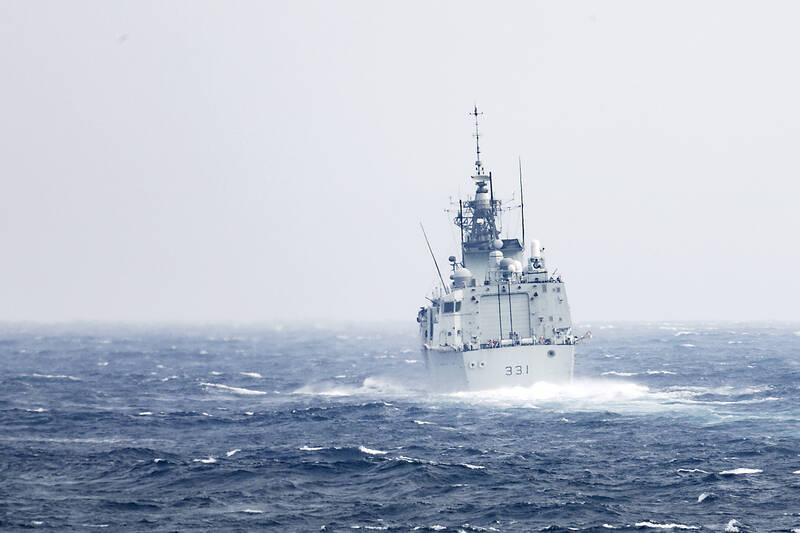A US destroyer and a Canadian frigate on Tuesday sailed through the Taiwan Strait in the latest joint operation aimed at reinforcing the route’s status as an international waterway.
Beijing views as its own the narrow body of water separating Taiwan from China — one of the world’s busiest shipping channels.
The US has long used “freedom of navigation” passages through the Strait to push back against Chinese claims and Western allies have increasingly joined these operations.

Photo: AP
The USS Higgins, an Arleigh Burke-class destroyer, in cooperation with the Royal Canadian Navy’s Halifax-class frigate the HMCS Vancouver “conducted a routine Taiwan Strait transit” on Tuesday “in accordance with international law,” the US Navy’s Seventh Fleet said.
“The ship transited through a corridor in the Strait that is beyond the territorial sea of any coastal state,” it said.
Canada said the Vancouver was en route to join an ongoing mission to enforce UN sanctions against North Korea when it transited with the Higgins.
“Today’s routine Taiwan Strait transit demonstrates our commitment to a free, open and inclusive Indo-Pacific,” Canadian Minister of National Defence Anita Anand said in a statement, using another term for the Asia-Pacific region.
In Taipei, the Ministry of National Defense confirmed the transit, saying in a statement that the military monitored the ships as they sailed north through the Strait, and did not see any irregularities.
Ministry of Foreign Affairs spokeswoman Joanne Ou (歐江安) yesterday said that her ministry welcomed and affirmed the stance of the Canadian and US governments regarding the legal status of the Strait as international waters, and the need to safeguard freedom of navigation, as well as regional peace and stability.
The passage also demonstrates democratic countries’ firm opposition to China’s attempts at expansionism, Ou said.
“The Taiwanese government will continue to strengthen its self-defense capabilities, resolutely resist authoritarian expansion and aggression, and deepen the close Taiwan-US security partnership,” she said. “We will strengthen cooperation with all like-minded countries to jointly safeguard the security of the Taiwan Strait and the rules-based international order.”
A spokesman for the Chinese People’s Liberation Army’s Eastern Theater Command called the transit “public hype.”
“The troops are always on high alert, resolutely counteract all threats and provocations, and resolutely defend national sovereignty and territorial integrity,” state broadcaster China Central Television quoted Colonel Shi Yi (施毅) as saying.
Australian, British, Canadian and French warships have sailed through the Strait in the past few years, sparking protests from Beijing.
The latest joint passage came a day after US President Joe Biden again declared that US troops would come to Taiwan’s aid in the event of a Chinese invasion.
It was the fourth time Biden made such comments, despite Washington’s longstanding official policy of “strategic ambiguity” — designed to ward off a Chinese invasion and discourage Taiwan from provoking Beijing by formally declaring independence.
Each time after Biden’s comments, the White House said there was no change in US policy on Taiwan.
Additional reporting by CNA

SECURITY: As China is ‘reshaping’ Hong Kong’s population, Taiwan must raise the eligibility threshold for applications from Hong Kongers, Chiu Chui-cheng said When Hong Kong and Macau citizens apply for residency in Taiwan, it would be under a new category that includes a “national security observation period,” Mainland Affairs Council (MAC) Minister Chiu Chui-cheng (邱垂正) said yesterday. President William Lai (賴清德) on March 13 announced 17 strategies to counter China’s aggression toward Taiwan, including incorporating national security considerations into the review process for residency applications from Hong Kong and Macau citizens. The situation in Hong Kong is constantly changing, Chiu said to media yesterday on the sidelines of the Taipei Technology Run hosted by the Taipei Neihu Technology Park Development Association. With

A US Marine Corps regiment equipped with Naval Strike Missiles (NSM) is set to participate in the upcoming Balikatan 25 exercise in the Luzon Strait, marking the system’s first-ever deployment in the Philippines. US and Philippine officials have separately confirmed that the Navy Marine Expeditionary Ship Interdiction System (NMESIS) — the mobile launch platform for the Naval Strike Missile — would take part in the joint exercise. The missiles are being deployed to “a strategic first island chain chokepoint” in the waters between Taiwan proper and the Philippines, US-based Naval News reported. “The Luzon Strait and Bashi Channel represent a critical access

‘FORM OF PROTEST’: The German Institute Taipei said it was ‘shocked’ to see Nazi symbolism used in connection with political aims as it condemned the incident Sung Chien-liang (宋建樑), who led efforts to recall Democratic Progressive Party (DPP) Legislator Lee Kun-cheng (李坤城), was released on bail of NT$80,000 yesterday amid an outcry over a Nazi armband he wore to questioning the night before. Sung arrived at the New Taipei City District Prosecutors’ Office for questioning in a recall petition forgery case on Tuesday night wearing a red armband bearing a swastika, carrying a copy of Adolf Hitler’s Mein Kampf and giving a Nazi salute. Sung left the building at 1:15am without the armband and apparently covering the book with a coat. This is a serious international scandal and Chinese

COUNTERINTELLIGENCE TRAINING: The ministry said 87.5 percent of the apprehended Chinese agents were reported by service members they tried to lure into becoming spies Taiwanese organized crime, illegal money lenders, temples and civic groups are complicit in Beijing’s infiltration of the armed forces, the Ministry of National Defense (MND) said in a report yesterday. Retired service members who had been turned to Beijing’s cause mainly relied on those channels to infiltrate the Taiwanese military, according to the report to be submitted to lawmakers ahead of tomorrow’s hearing on Chinese espionage in the military. Chinese intelligence typically used blackmail, Internet-based communications, bribery or debts to loan sharks to leverage active service personnel to do its bidding, it said. China’s main goals are to collect intelligence, and develop a